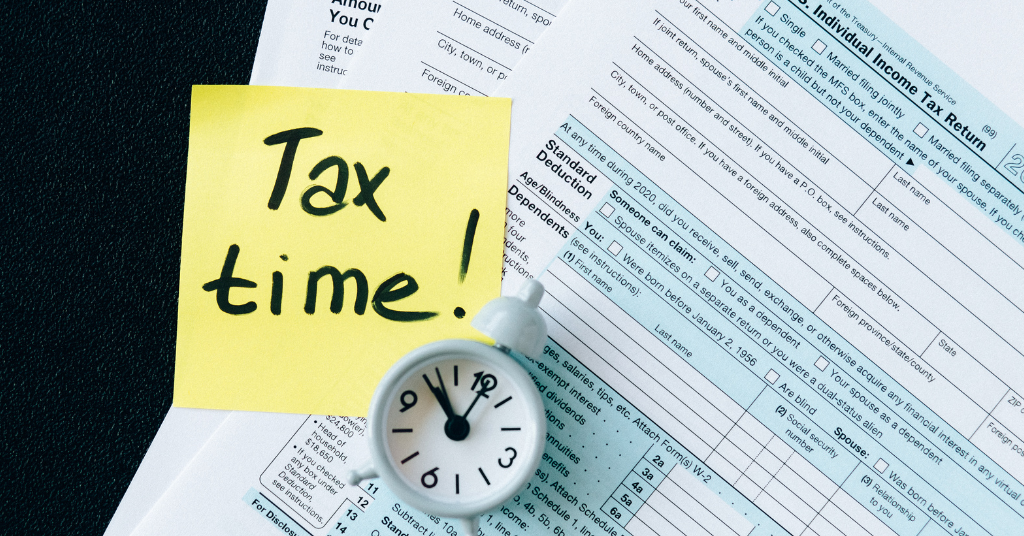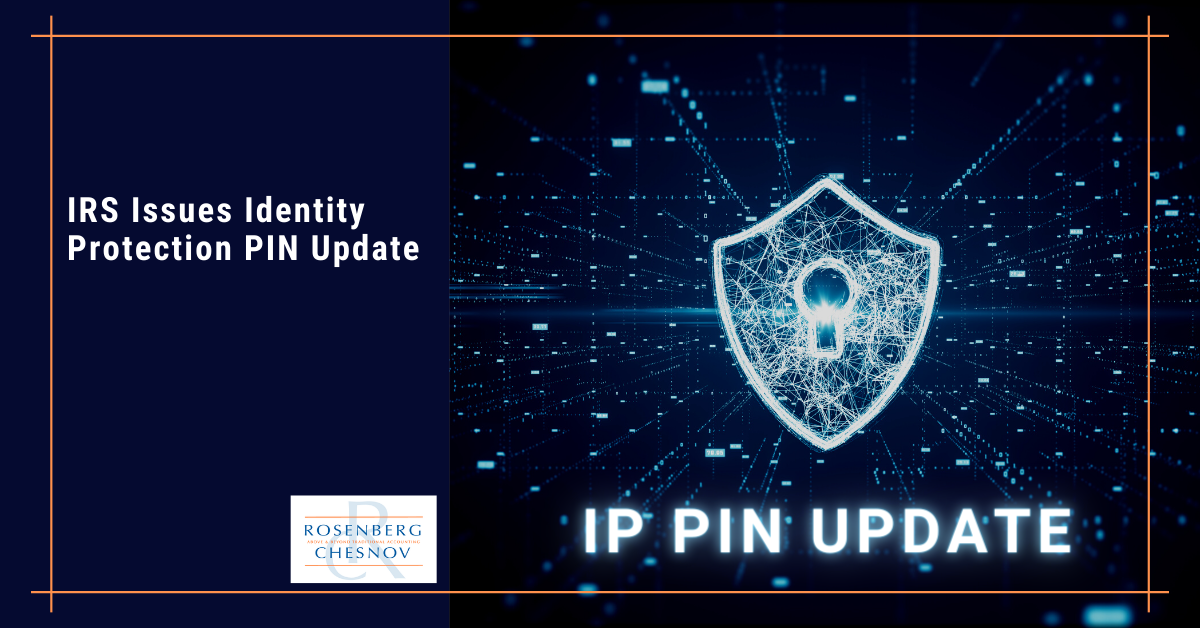

Maximize Your 2024 Refund: Tax Breaks You Might Be Missing
Category: Accounting
Identity theft and related fraud have been on a troubling rise for several years, with about a third of Americans now considered likely to be victimized by some identity theft in their lifetimes, according to the National Council on Identity Theft Protection.
These shocking numbers mean this is a real and present threat for every taxpayer — and the consequences for your financial well-being can be devastating, and recovery can be time-consuming and demoralizing.
Identity theft can happen to anyone — so every individual should take steps to be prepared.
Fortunately, the IRS has made it a top priority to crack down on tax fraud. As part of that effort, the Identity Protection PIN Opt-In Program (IP PIN) is available to all taxpayers who can verify their identities.
What’s more, in a recent update, the IRS has provided additional information to help taxpayers apply for and retrieve an IP PIN — even those who do not have access to online tools.
Continue reading for an overview of the critical information you need to know regarding your IP PIN and a dive into what the latest IRS update has revealed.


An Identity Protection PIN is a unique six-digit number, known only by you and the IRS, that prevents someone else from filing a tax return using your Social Security number or Individual Taxpayer Identification Number.
This PIN is a critical safeguard against unauthorized individuals filing fraudulent tax returns in your name. Like any other PIN, it authenticates that you are who you say you are, thereby protecting your account and personal information.
The program is voluntary — however, the IRS highly recommends taxpayers take this proactive step to protect themselves from tax-related identity theft.
Using an IP PIN adds an additional barrier that enhances the security of your sensitive financial information and reduces the risk of falling victim to identity theft.
If you want to request an IP PIN, please note:
Here are a few more things taxpayers should know about the IP PIN Opt-In program before applying:
The fastest way to obtain an IP PIN is by using the online Get an IP PIN tool between mid-January and mid-November. If you don’t already have an account on IRS.gov, you must register to validate your identity using the Secure Access authentication process.
If you cannot successfully validate your identity using this tool, there are alternatives to apply for your PIN.
However, these methods take longer than the online tool for the IRS to assign your IP PIN to you.
An IRS update issued earlier this year outlines two ways taxpayers unable to use the online tool can retrieve their IP PIN.
If your adjusted gross income falls below $73,000 for Individuals or $146,000 for those filing jointly, and you’re unable to utilize the online tool, Form 15227, Application for an Identity Protection Personal Identification Number is available to you.
Here’s what you’ll need:
Once you fill out and submit Form 15227, the IRS will contact you to validate your identity using the phone number you provided on the form. Once the verification is complete, anticipate your IPPIN’s arrival via the U.S. Postal Service within four to six weeks. Subsequently, expect annual deliveries of your IP PIN right to your mailbox.
Two important notes of caution: First, keep in mind that due to the processing timeline, it could take the IRS up to six months to finalize Form 15227 requests.
Second, if you have an existing IP PIN that you cannot retrieve, you should not apply for a new one using Form 15227. This form application process is only for taxpayers who are newly opting into the program.
In cases where online verification or Form 15227 isn’t a viable avenue, or you don’t meet the Form 15227 criteria, you can make an appointment for a face-to-face meeting at your local Taxpayer Assistance Center.
Here’s your checklist for this option:
After successfully validating your identity, the IRS will send your IP PIN via the U.S. Postal Service in approximately three weeks. You will subsequently receive your IP PIN in the mail annually.
To use your PIN, you can enter it when prompted by your tax software product or provide it to trusted tax professionals (like us!) who are assisting in preparing your return.
An important point: you will use your IP PIN only on Forms 1040, 1040-NR, 1040-PR, 1040-SR, and 1040-SS.
You must enter your PIN correctly on electronic and paper tax returns to avoid rejections and delays. An incorrect or missing IP PIN will result in the rejection of your e-filed return or a delay of your paper return until it can be verified.
If you lose your IP PIN or don’t receive a new one in the mail, you’ll need to retrieve it before you can e-file your return. You can do so using the Get an IP PIN online tool to retrieve your current PIN. (If you don’t already have an account on IRS.gov, you will be asked to register and validate your identity; due to increased security, you may also be asked to verify your identity again, even if you have an existing account.)
Finally, if you are unable to retrieve your PIN online, you may call the IRS at 800-908-4490 for specialized assistance Monday through Friday, 7 AM to 7 PM your local time — unless it’s after October 14 and you haven’t filed your current or prior year Forms 1040 or 1040 PR/SS.
In that event, if you cannot use the online tool, your best alternative is to file your tax return by paper without your IP PIN. The IRS will then review your return to confirm it’s yours, but this could delay any refund you may be due.
If dealing with retrieving or replacing your PIN sounds like a headache-inducing hassle, then there’s another priority to keep in mind — one that’s vital for anyone taking advantage of this program.
Remember, your IP PIN should be known only to you and the IRS. That means don’t reveal it to anyone!
You can reveal your PIN to a trusted tax professional, but only when you are ready to sign and submit your return.
The IRS will never ask for your IP PIN, and any phone calls, emails, or texts asking you for it are scams — always.
Operating as a business allows you to deduct expenses and losses that you cannot as a hobbyist. Operating as a hobby limits your deductions but does allow you to avoid paying self-employment tax.
Getting this wrong can have serious implications, and whether you operate a business or a hobby is more complicated than whether or not you make a profit. It is about intent, which depends on interpretation.
Understanding how the IRS determines these classifications can save you from heavy penalties or even an audit… not to mention making your activity more successful and rewarding, whether it’s for business or pleasure.
If you are a client and would like to book a consultation, call us at +1 (212) 382-3939 or contact us here to set up a time.
If you aren’t a client, why not? We can take care of your accounting, bookkeeping, tax, and CFO needs so that you don’t have to worry about any of them. Interested? Contact us here to set up a no-obligation consultation.


Category: Accounting


Category: Accounting


Category: Accounting
Send us a message and we will contact you as soon as possible.
Jeff Coyle, CPA, Partner of Rosenberg Chesnov, has been with the firm since 2015. He joined the firm after 20 years of business and accounting experience where he learned the value of accurate reporting, using financial information as a basis for good business decisions and the importance of accounting for management.
He is a diligent financial professional, able to manage the details and turn them into relevant business leading information. He has a strong financial background in construction, technology, consulting services and risk management. He also knows what it takes to create organizations having built teams, grown companies and designed processes for financial analysis and reporting.
His business experience includes:
Creating and preparing financial reporting, budgeting and forecasting.
Planning and preparation of GAAP and other basis financial statements.
Providing insight on financial results and providing advice based on those results.
Jeff also has a long history of helping individuals manage their taxes and plan their finances including:
Income tax planning and strategy.
Filing quarterly and annual taxes.
Audit support.
General financial and planning advice.
Prior to joining the firm in 2015, Jeff was in the private sector where he held senior financial and management positions including Controller and Chief Financial Officer. He has experience across industries, including construction, technology and professional services which gives him a deep understanding of business.
Jeff graduated from Montclair State University, he is a CPA and member of the American Institute of Certified Public Accountants, New York State Society of Certified Public Accountants and New Jersey State Society of Public Accountants.
Jody H. Chesnov, CPA, Managing Partner of Rosenberg Chesnov, has been with the firm since 2004. After a career of public accounting and general management, Jody knows the value of good financials. Clarity, decision making, and strategy all start with the facts – Jody has been revealing the facts and turning them into good business results for more than three decades.
He takes a pragmatic approach to accounting, finance and business. His work has supported many companies on their path to growth, including helping them find investors, manage scaling and overcome hurdles. His experience and passion for business reach beyond accounting and he helps businesses focus on what the numbers mean organizationally, operationally and financially.
He has a particular expertise in early-stage growth companies. His strengths lie in cutting through the noise to come up with useful, out of the box, solutions that support clients in building their businesses and realizing their larger visions.
Prior to joining the firm in 2004, Jody was in the private sector where he held senior financial and management positions including General Manager, Chief Financial Officer and Controller. He has experience across industries, which gives him a deep understanding of business.
Jody graduated with a BBA in Accounting from Baruch College, he is a CPA and member of the American Institute of Certified Public Accountants and New York State Society of Certified Public Accountants.
In addition to delivering above and beyond accounting results, Jody is a member of the NYSCPA’s Emerging Tech Entrepreneurial Committee (ETEC), Private Equity and Venture Capital Committee and Family Office Committee.
He is an angel investor through the Westchester Angels, and has served as an advisor for many startup companies and as a mentor through the Founders Institute.